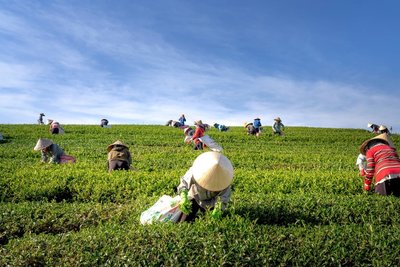Blockchain is no longer a foreign concept. After it had reached a fever pitch in 2017 when Bitcoin soared to popularity, the technology has been adopted by many industries, most prominently finance, health care, and the legal sector. Given that blockchain's main boon is its decentralised database, which uses state-of-the-art cryptography for enhanced protection, the banking sector leverages this feature to create a more secure way of storing data, as well as a faster and cheaper method of transferring money between parties. In the legal sector, the World Intellectual Property Organization describes how blockchain technology can be used to provide protection for intellectual property owners, as well as help make rights management easier. It can also be utilised to track distribution, making a copyright lawyer's job easier.
The farming industry also benefits from blockchain technology in more ways than one. As discussed in a previous Internet of Food & Farm 2020 post, the marriage of digital technology and farming is nothing new. In fact, agriculture is one of the few sectors that can make the most out of blockchain, and here's why:
Fair pricing and transparency
Disruptor Daily notes how commodity price fluctuations affect the quality of life for farmers. Since commodity prices are extremely volatile due to weather conditions, inelastic demand, inelastic supply, and the global market, farmers' incomes are not always consistent. This can be mitigated with a blockchain platform that can maximise the boom times. If a blockchain-driven platform offers farmers data about transaction trends, global market demand, the stock price of commodities, and more, they will have the capacity to negotiate fairer prices, especially in areas where the internet is barely accessible. This is already being put into practice by Indian smallholder farmers, where they use a decentralised application to gain access to supply chain monitoring and an avenue in which they can directly get in touch with potential retailers and produce organisations.
More efficient supply chain distribution
Blockchain can be used to keep tabs on when and where a particular variety of crop was planted, which specific fertilisers were used, when crops were harvested, and where exactly they grew. The Next Web highlights how tracing the product's journey from seed to store shelf will shed light on where an item was transported to and by whom. That way, farmers and retailers will have an easier time proving that the goods they are selling that they claim to be organic or free-range actually are.
Promoting sustainability
The practise of penalising illegal and unsustainable practises with blockchain, just as it happens with the diamond industry, can also be carried out in agriculture. The Food and Agriculture Organization of the United Nations asserts that such an initiative is currently being developed to track products based on geographic indicators (GI) and other factors, empowering consumers and providing a way to encourage and reward good practises. Farmers abiding by sustainable practises can then be incentivised, which can hopefully urge others to stop using methods that lead to environmental degradation.
Faster payments for smallholder farmers
Farmers also often run into issues with funding. They don't always receive payments and acquisitions when they need them. Technology.org points out that since farming involves big corporate business, there are a lot of things that are taken into account, including inspections that can be lengthy and delay the process further. Luckily, with blockchain in the picture, there can be faster exchanges in general, benefiting all farmers, especially the smallholders. They can enjoy real-time payments for goods and services rendered, as well as complete transparency since everything that happens throughout the process can be tracked. Forbes notes that there is now an app that makes this possible, granting small farmers the same tools as big farm operations. The said app utilises smart contracts to deliver accelerated payments to the farmers, which can sometimes be critical to struggling farming businesses.
At this point in time, blockchain technology is no longer a novelty in the farming sector — it's starting to gain traction. Soon, it will have infiltrated the industry enough to result in fairer and much more efficient trading for all farmers.
